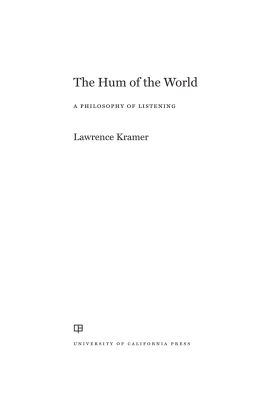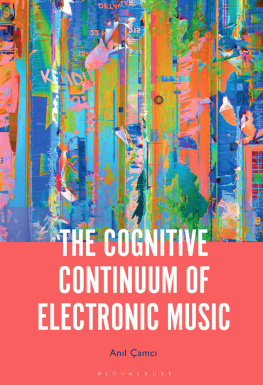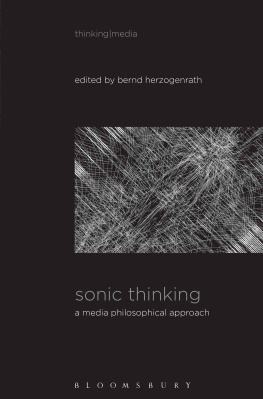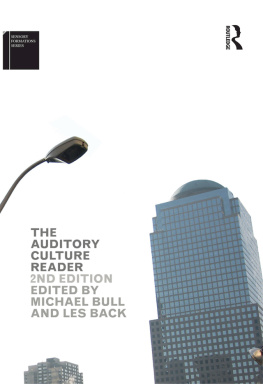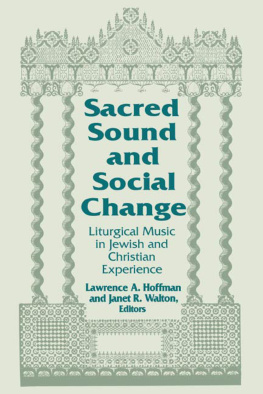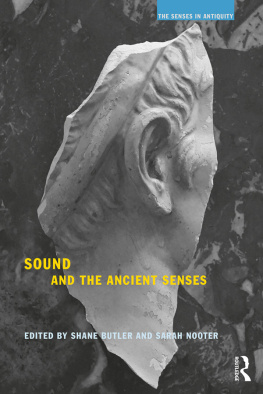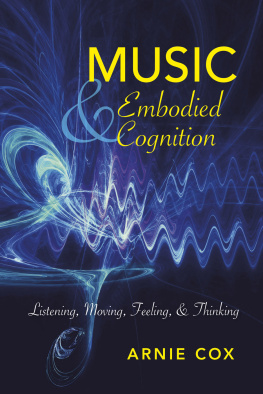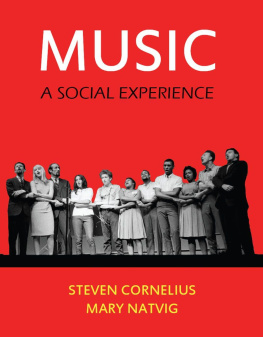University of California Press, one of the most distinguished university presses in the United States, enriches lives around the world by advancing scholarship in the humanities, social sciences, and natural sciences. Its activities are supported by the UC Press Foundation and by philanthropic contributions from individuals and institutions. For more information, visit www.ucpress.edu.
Cataloging-in-Publication Data is on file with the Library of Congress.
Prelude
I.
This is a book about the meaning of sound. The rise of sound studies across the humanities has drawn welcome attention to the material dimension of sound and to the technologies that shape auditory culture. These advances need to be complemented by a new examination of how sound is represented and imagined. The Hum of the World conducts such an examination across a wide range of sources, including artistic and conceptual sources from classical times to the present. Its purpose is to outline the fundamental character of auditory experience in the Western world as we describe or narrate or record or interpret itgenerally speaking, as we apprehend it.
To that end, the books segments gravitate around two core ideas. The first is that sound is the measure of life. Sound is the primary medium through which the presence and persistence of life assume tangible form. The sense of life spreads outward from sound, which conveys it as feeling and imparts it as meaning. This relationship is primary. The positive experience of aliveness is not merely in accord with sound, but inaccessible and perhaps inconceivable without it. The second idea is that this animating power of sound acts as a general background to sense perception. But it does not always remain in the background. The diffuse hum of the world can also become audible its own right. It has made itself heard in numerous venues from classical times to the present. When that happens, animation and the potentiality of sound fuse into a positive form capable of changing the apprehension of anyone who hears it.
These features of sound are both sensory and symbolic. They rank among the foremost means by which sound acquires a history. They also give listening the power to observe and reflect on itselfto become self-aware. Recognizing them makes possible a philosophy of listening that greatly expands the scope of what sound, as sound, can tell us. The sense of hearing grounds the sense of being.
II.
In form, this book models itself after some of my favorite texts, each composed in the spirit of textual and conceptual adventure: Montaignes Essays, Nietzsches The Gay Science, Benjamins One-Way Street, Adornos Minima Moralia, Wittgensteins Philosophical Investigations, Barthess A Lovers Discourse, Derridas The Postcard. In other words, The Hum of the World is an assembly of varied but interrelated reflections, set out in an intuitive sequence meant to suggest flow rather than structure. The flow also belongs to the auditory phenomenon that gives the book its subject and to the conceptual process that the book seeks to embody. The associative form deliberately avoids chronological or topical arrangement. It seeks to create a kind of soundscape in words, a loosely bounded multiplicity full of overlaps, cross-references, echoes, and intimations. Once past the first few sections, which introduce a number of key concepts, the vignettes and short essays that compose the book may equally well be read consecutively or piecemeal, in no particular order. Even segments that overlap may be read independently; cross-references are noted in the text. The freewheeling organization is meant to be reader-friendly, as is the writing, which aims to be evocative but is jargon-free.
To give sound its due, to recognize that experience is more essentially auditory than we may have supposed, is to listen widely. Both the topics to be addressed and the means to address them may belong, together or separately, to philosophy, aesthetics, music, media, literature, science, and history, on the understanding that the divisions between these fields of inquiry are more apparent than real, or at least thoroughly permeable. In recent years the boundaries between speculative and empirical thought have become the subject of renewed debate between those who want to harden them and those who want to break them down. It should already be obvious which side Im on.
What follows will divide, with inevitable overlaps, between speculative passages and passages of what would ordinarily be called readings, but here might be better identified as soundings. The rest is up to you. Treat, if you will, this book as a sounding board. Please scribble in the margins.
Sound and Knowledge
The world is alive with sound. The aim of this book is to gloss this deceptively simple sentence. The gloss is cumulative, a resonance produced by the series of segments conceived as an extended polyphony. The topics vary widely, but certain themes keep returning, as they might in a piece of music: what sound makes known, what listening reveals, what music conveys, what hearing promises, and one thing more, held by all these in common, which will take some explaining: a phenomenon I propose to call the audiable, or the hum of the world.
In recent years hearing has come to rival sight, even to equal it, among the principal means by which we make sense of things. To a large degree this change has been driven by technology. We live (at any rate in advanced societies) in a world saturated by recorded and transmitted sound, by ringtones and notifications and voices on mobile phones, by music and media everywhere. These sounds no longer seem to strike us as noisy; they have become the very sound of the ordinary. Our nineteenth-century forebears heard a similar change in the once-obtrusive sounds of modern mechanical technology. Our saturated sonic environment has, like those mechanical sounds, become second nature.
In this context, the development of a new academic field, sound studies, was inevitable. Cultural history is in part being rewritten as auditory history; our heightened awareness of the soundscape of modern life extends retrospectively to its predecessors. In one respect, however, this auditory turn is still incomplete. It has left unanswered, has perhaps barely even asked, a fundamental question. How does finally learning to listen change our conception of the world? In other words, what does sound, as sound, contribute to the production of human knowledge?
By knowledge hereand the point is essentialI mean neither sense experience nor empirical understanding. The knowledge in question is the extrapolation from experience that constitutes the work of the modern humanities, the knowledge produced by critical thought, interpretation, representation, narration, imagination, philosophical reasoning, and so on. The value of this knowledge has always been subject to debate. It has most recently been challenged by cognitive science on one hand and information processing on the other. The survival of humanistic knowledge can no longer be assumed. In asking its question about the work of sound, this book seeks simultaneously to practice, extend, and ratify the mode of knowledge that it examines.

